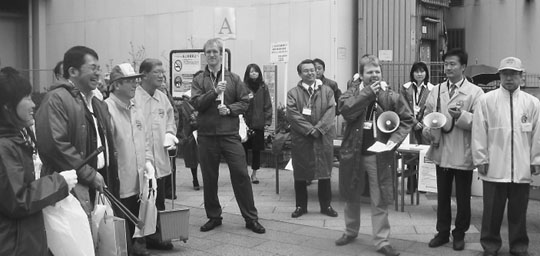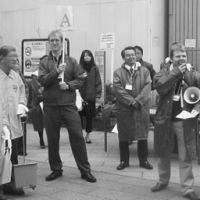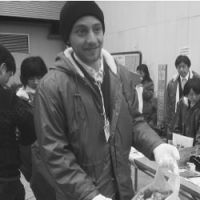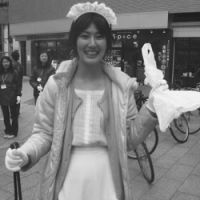It was unusually warm and windy that particular Friday afternoon last month on which blew haru ichiban, the first strong, warm wind of the spring.
The wind failed to deter the 85 people from 11 countries gathered in the spirit of community goodwill and cooperation and about to help clean up Akihabara — Tokyo's mecca of electronic gadgets, anime and subculture.
Japanican, Inc., a JTB Corp.'s subsidiary wooing overseas tourists to Japan, organized the event, dubbed "Clean and Cool Communication @ Akiba." Akiba is the widely used nickname for Akihabara.
The event, being held for the second time, was pegged to the government-designated "Yokoso! Japan Weeks" between late Januray and late February. During the period, travel agencies, department stores, restaurants and amusement facility operators offered discounts and organized special events in the hope of drawing tourists during one of the industry's slowest times of the year.
The cleanup project likely did little to help ease the pains of the tourism industry, hurt by global recession and the strong yen. It did, however, surely help participants feel good about themselves.
Ali Zaidi, a 32-year-old Pakistani physician working on a doctorate degree in cardio genetics at the Tokyo Medical and Dental University took part in "Clean Akiba." He admired Tokyo, saying, "I have lived in the U.K. and the U.S., and Tokyo is the cleanest place. I want to understand how Japanese keep their cities clean."
He liked the mix he found in Japan, high-tech alongside a mind-set that has people volunteering to clean up the streets. From a non-Japanese person's standpoint he said, "I think it's important to understand (this mentality) in order to become better integrated into society."
Zaidi, along with nine other foreigners from some six countries — Italy, France, Pakistan, Singapore, China, and Vietnam — volunteered to help clean up the Akihabara streets after they saw the notice posted on the Japanican Web site or on posters hung in foreign-exchange student dormitories.
Japanican employees from the United States, Britain, Belgium and South Korea also took part, as did volunteers from Tokyo's Chiyoda Ward.
JTB spokeswoman Akiko Mitsuhashi described the event as "a way to show hospitality to foreigners. The concept is to work together cleaning up a place famous among both Japanese and non-Japanese."
"This is a meaningful event. We should do something for the environment," said Singaporean tourist Tan Li Chean, 40, who learned about the event on the JTB Web site in her home country. "Singapore is similar to Tokyo. They keep the city clean."
But Chinese office worker Vivian Wenjing Liu, 37, who has lived in Japan for 10 years, had a different opinion.
"I know some Japanese have bad manners. That is why I want to help today," she said.
On the other hand, Olivier Faure, 23, a French intern at the Japan Aerospace Exploration Agency in Tokyo's Chofu, was there for the socializing opportunities.
"I have a friend at Japanican and I thought it was a good chance to meet people," said Faure, who came to Japan only five months ago.
The event kicked off with a speech by Takashi Kogure, vice chairman of a small local group helping to improve the area around Akihabara Station.
Participants were then divided into two teams and hit the road with plastic bags and tongs at 3 p.m. Streets were busy with business men, tourists and others, including girls clad in maid outfits handing out flyers that largely ended up tossed carelessly on the streets.
Cigarette butts, toothpicks, flyers, paper napkin wrappers, paper coffee cups, rubber bands and more all went into the bags. Gum was scraped off the pavement.
"There's not so much trash. Japan is much better than Italy," said Silvia Telloni, 26, an Italian office worker who has lived in Japan for three years. "I am always impressed with the good manners of the Japanese."
British Japanican employee Maruen Mahgiub had a different impression, saying he saw people drop litter even as they watched the group picking up trash. "Still, Tokyo is much better than London," he said and acknowledged that "Japan has a good reputation of being clean. I hope young people keep up the reputation."
Some 45 minutes after they set out, the volunteers gathered once again in front of Akihabara Station.
The winner of a ticket for two to the popular Mount Fuji and Hakone area was announced. Free bottles of green tea were handed out and Japanican President Hiroyuki Imaizumi bid participants farewell. "When you get home, please tell your families you've helped clean up Akihabara, a place loved by foreigners and Japanese alike."









